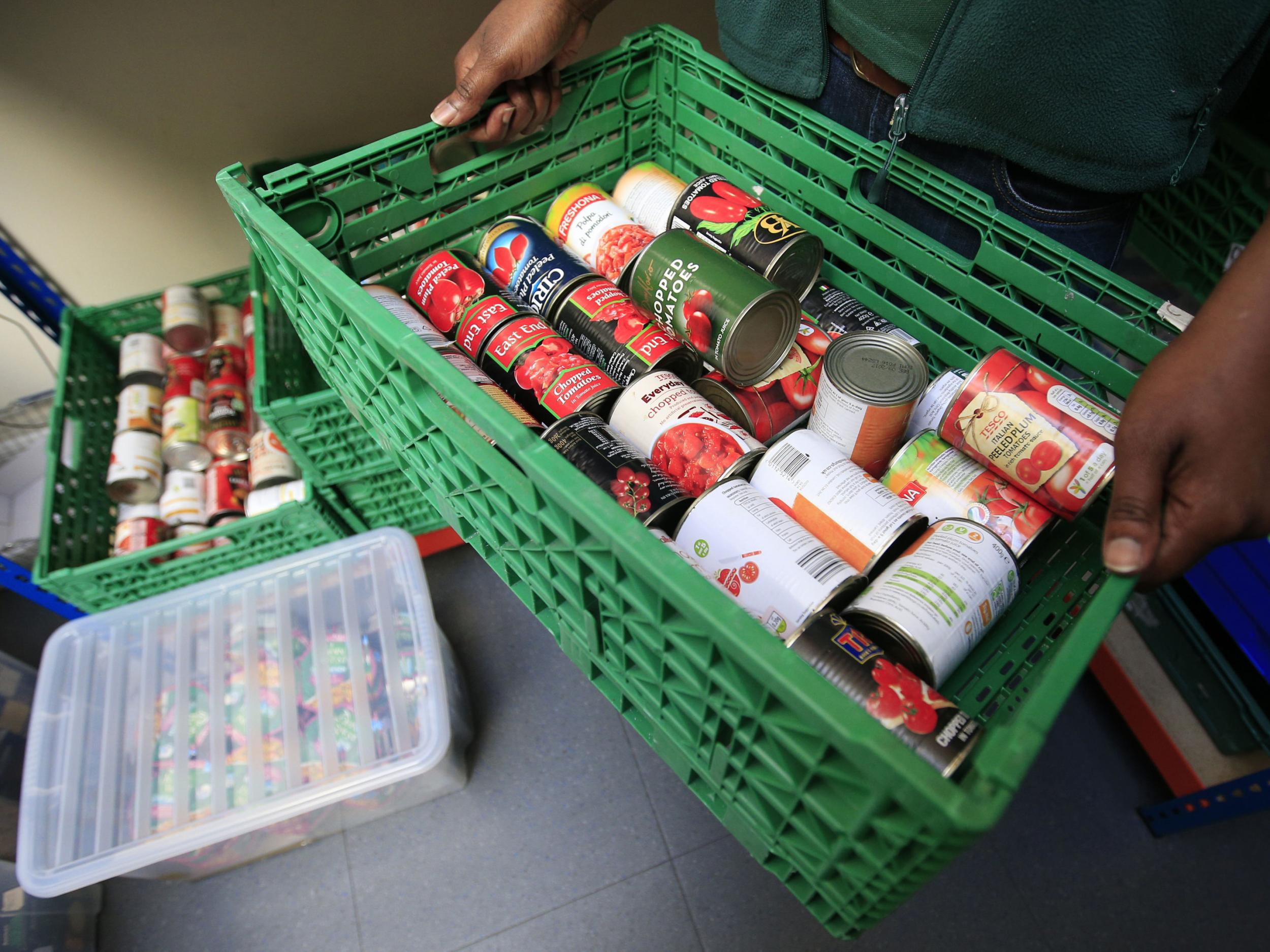Food-bank users have average of £7.10 a day to live on, research shows
‘It’s just impossible, it really is. I go to bed at night wishing I never wake up in the morning,’ says food-bank user

Food-bank users have on average just £7.10 a day to live on, according to a new report revealing the extent to which poverty and changes in the welfare system are affecting thousands of households across the UK.
Research commissioned by the Trussell Trust, Britain’s largest food bank provider, reveals the median weekly income after housing costs for households relying on food parcels was £50 in late 2018, “drastically lower” than the official relative poverty threshold of £262 per week.
The findings, in the first annual report of a three-year long research project, suggest that people are being forced to appeal for food parcels for three main reasons: problems with the benefits system; ill health and challenging life experiences; and a lack of local support.
Food-bank use soared to record levels last year, with 1,583,668 three-day emergency food supplies distributed in the 12 months to March 2019 – a 19 per cent rise on the previous year – with more than half a million of these (577,618) going to children.
The new report finds that food-bank users often rely on benefits, with two-thirds reporting problems with the welfare system, including a reduction in the value of benefit payments, being refused disability benefits, sanctions, and delays in payments like the five-week wait for universal credit.
The research also shows that the majority of people referred to food banks have experienced a challenging life event, such as an eviction or household breakdown – which often increase living costs and make it harder to maintain paid work or to successfully claim benefits – in the year prior to using the food bank.
Almost three in four food-bank users have a health issue or live with someone who does, with more than half of these relating to mental health and a quarter being long-term physical conditions – which can increase living costs and be a barrier to doing paid work.
The findings also show that particular groups of people were more likely to need a food bank, such as single mothers, with 22 per cent of people at food banks being single parents, the majority of whom are women.
One food-bank user, named only as Amanda in the report, told researchers £130 of her £138 fortnightly benefit payment for a health condition went to paying arrears, leaving her with only £8 to live on.
“If I don’t pay my bills, then I’ll get the house taken off me. After paying arrears, I’ve got £8 a fortnight and that’s to pay for gas, electric, water,” she said. “So it’s just impossible, it really is. I go to bed at night wishing I never wake up in the morning.”
The study also finds that the vast majority of people at food banks have either exhausted support from family or friends, are socially isolated, or have family and friends who are not in a financial position to help.
Emma Revie, chief executive of the Trussell Trust, said the findings exposed the need for urgent changes in the benefit system, including ending the five-week wait for universal credit and ensuring benefit payments cover the true cost of living.
In a sign that universal credit is driving people to food banks, a report from the charity in September revealed a surge in demand in areas where families had been relying on the new welfare system for the longest.
“Hunger in the UK isn’t about food – it’s about people not having enough money. People are trying to get by on £50 a week and that’s just not enough for the essentials, let alone a decent standard of living,“ said Ms Revie.
“We created a benefits system because we’re a country that believes in making sure financial support is there for each other if it’s needed. The question that naturally arises, then, is why the incomes of people at food banks are so low, despite being supported by that benefits system?”
Shadow work and pensions secretary Margaret Greenwood echoed the remarks, saying there was “no clearer sign of the impact of years of harsh, punitive Conservative policies than the ever increasing numbers of people forced to turn to food banks to survive”.
She pledged that Labour would scrap universal credit, abolish the benefit cap and end the five-week wait to ensure that the social security system protects people from poverty.
Faye Goldman, director at the charity Gingerbread, said it was “shocking” that 22 per cent of food-bank users in 2019 were single parents, adding: “The government needs to wake up and realise the true impact of a benefits system that isn’t providing a safety net for those who need it.

“It simply isn’t right that single parents, most of whom are working, are being forced into poverty with little hope of escape.”
A DWP spokesperson said: “We take this report very seriously and continue to work closely with the Trussell Trust on this important issue. We spend more than £95bn a year on the welfare safety net, but we continue to make improvements to get people the support they need and prevent them falling through the cracks.
“Already we have simplified the benefits system with universal credit, making it easier for people to access support. And this week we have announced working-age benefits will rise in line with inflation from April, giving millions of people more money in their pockets.”
Join our commenting forum
Join thought-provoking conversations, follow other Independent readers and see their replies
Comments
Bookmark popover
Removed from bookmarks